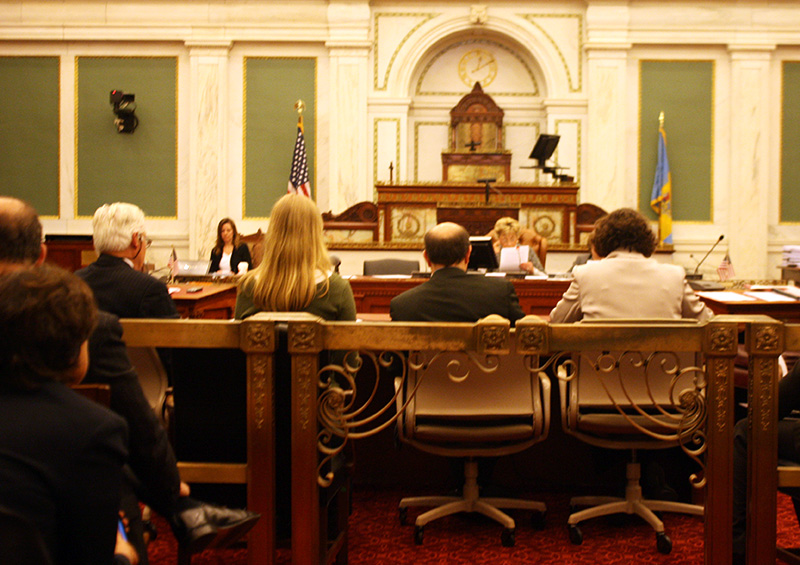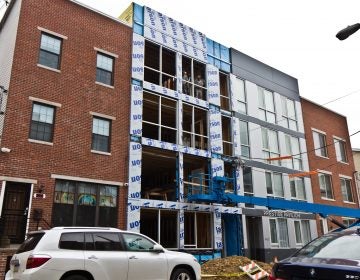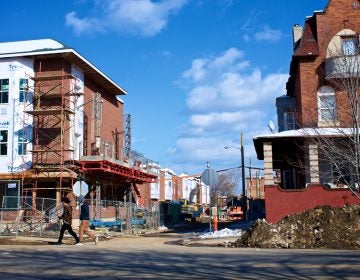Committee of the Whole favorably recommends ZCC final report

The final report of the Zoning Code Commission cleared its penultimate hurdle Wednesday morning when Bill No. 110845 was passed out of City Council’s Committee of the Whole with a favorable recommendation. The bill will get a first reading before Council Thursday morning, and will likely be voted on at Council’s next session, on December 15th. No Committee members voted against the bill on Wednesday.
Bill 110845, which would repeal and replace Title 14 of the Philadelphia Code, was accompanied on the Council agenda by six other bills, four of which concerned appointing officers to the City Avenue Special Services District of Philadelphia. John Smithson, Bernie Prazenica, Matthew Schure and Jeffrey B. Goldstone were all unanimously appointed to the District’s Board of directors.
Bill No. 110835, itself an amendment to the zoning code, was subject to some last-minute amendments from members of City Council. The bill further defines the code provision on conditional approvals. At the last meeting of the ZCC, Craig Schelter of Development Workshop said the existing definition of conditional approvals prevented the Final Report from allowing development to proceed as a matter of right, one of its central purposes. The bill, introduced by Councilwoman Tasco, will amend the text of the code—after the report passes—to the satisfaction of Schelter and the Workshop.
Bill No. 110844 amends Title 4 of the Code to transfer and revise the schedule of fees from the current Zoning Code to the Administrative Code. All seven bills on Wednesday’s agenda were passed out of Committee with favorable recommendations.
Three hours of testimony on the bills began with two familiar faces: Deputy Mayor for Economic Development Alan Greenberger and former ZCC Executive Director Eva Gladstein. Greenberger reminded Council of the copious amount of work that’s been done in preparing the new zoning code, and recommended approving all three bills concerning its passage.
“The product of this work is the Final Report that was adopted by the ZCC on November 9th, and which is included as Attachment A to Bill #110845,” Greenberger said in a prepared statement. “If [the bill is] approved, Philadelphia will enjoy a modern, up-to-date zoning code for the first time in 50 years.”
He also told Council about a handful of “follow-up activities” being prepared by the Planning commission to help the City transition to the new Code. These include developing a training program for city officials and the public, posting a Zoning Administrative Manual for public comment, and drafting legislation for Sign Controls, among other things. Gladstein did not give testimony.
The second panel consisted of David Perlman from the Building Industry Association, James White of the Philadelphia Association of Community Development Corporations, David Brownlee of the Design Advocacy Group, and Stephen Huntingdon of the Crosstown Coalition. The organizations represented on that panel are not ones that typically advocate the same initiatives. However, each panelist urged the Committee to approve the Final Report.
Huntingdon thanked the ZCC for its work, and complimented Council on its “vision.” “It is indeed a wonderful thing,” Huntingdon said, “at this torturous time in American history, to see a legislative body get its work done.”
The third panel was equally united in its recommendation to pass the Commission’s Final Report. It consisted of Elizabeth Masters of the American Institute of Architects, David Feldman of Right-Sized Homes, Kristen Suzda of the Delaware Valley Green Building Council, Craig Schelter of Development Workshop, and Cheryl Gaston, Chair of the Real Property Section of the Philadelphia Bar Association. Those witnesses are usual suspects; all have testified before Council and the Zoning Code Commission at previous hearings. Schelter was explicit in thanking two individuals who have been involved in the reform process: Stacey Graham, a legislative aide to Bill Green, and Natalie Shieh, a staff member of the Zoning Code Commission. Schelter said that Graham and Shieh are “jewels to have in public service.”
After the third panel’s testimony, Councilman Bill Green thanked each witness for his or her own commitment to reforming Philadelphia’s zoning code.
The fourth panel of witnesses began with the same level of enthusiasm for the new code as the previous three. Rich DeMarco, a former Zoning Code Commissioner and new attorney at Elliot Greenleaf, said that Council needed to look past imperfections in the Final Report and “have faith” in the work of the ZCC. “In passing this legislation,” DeMarco said, “this body will send a message to everyone who lives and works and does business in this City that it can overcome the naysayers, the critics and the cynics, and bring beneficial and needed change to this City.” Penelope Giles, director of the Francisville Neighborhood Development Corporation, also urged Council to adopt the new code.
A third member of the panel, Center City resident Gary Spahn, complimented the Commission on clarifying the code, but expressed concern that conversion of some districts—particularly R-10 to RM-1—would change the type of development expected in certain areas. He said he was worried that multi-family dwellings would crop up in places where single-family dwellings are more appropriate.
During the fifth panel of witnesses, support for the new code broke down. The panel consisted of Tiffany Green of Concerned Citizens of Point Breeze, James Royal of Strawberry Mansion Business Association, James Harris of Southwest AID, and Jerome Whack, a resident of Point Breeze. Tiffany Green’s testimony was the lengthiest of the four, and the most heated. She recommended to Council a “Housing Conformity Amendment” which would prohibit the development of houses 3 stories high or taller on blocks where at least 25 percent of the housing is made up of two-story homes. She said that the expansion of residential height regulations from 35 ft. to 38 ft. would be detrimental to the character of many neighborhoods in Philadelphia. Her proposed amendment carries five recommendations which would keep two-story blocks strictly two stories. Green said that allowing bigger houses onto two-story blocks would push out lower-income residents.
Members of Council and the Planning Commission said the amendment was problematic because it discourages development in neighborhoods that they believe need investment. Deputy Mayor Greenberger also told Green that the extended height regulations don’t allow three-story homes on two-story blocks any more easily than the current code does. A three-story home can be built on a two-story block today without a variance, Greenberger said. He said the new code requires set-backs on third-story additions, which is a stricter regulation than any currently in place.
Further testimony, particularly from Madeline Shikomba and Juanita Cummings, focused on the new code being beneficial for the development community at the expense of residents. Shikomba said that enacting the new code would “widen the divide” between the haves and have-nots in Philadelphia. “We feel the new zoning code is too developer-friendly and neighborhood-unfriendly,” Shikomba said.
Cummings said the code provision on Registered Community Organizations would set a precedent of some neighborhood groups—particularly those with the capacity to organize and exert political power—having more recognized sway than others. She urged Council not to adopt a new code without giving all residents of Philadelphia “an understanding of what’s about to happen.”
Alan Greenberger sought to reassure the witnesses and members of Council that residents’ right to testify at zoning hearings concerning development in their neighborhoods will remain exactly as strong as it is today when the new code goes through. He said the RCO provision is a way to encourage groups to organize and register with the Planning Commission.
When the public testimony ended, Council unanimously voted to pass each bill in question out of the Committee of the Whole with a favorable recommendation.
After the Committee hearing, Eva Gladstein reiterated Greenberger’s suggestion that the new code won’t immediately open the door to three-story homes taking over two-story neighborhoods.
“Even though some communities traditionally have predominantly two-story homes,” Gladstein said, “the height limit in those communities is still 35 feet. Somebody today could come in and build to 35 feet. That’s not happening because there’s not a demand for it.”
Council is expected to vote on—and likely to pass—the new zoning code next Thursday, December 15th.
Contact the reporter at jaredbrey@gmail.com
Correction: An earlier version of this article misspelled the name of Natalie Shieh. PlanPhilly regrets the error.
WHYY is your source for fact-based, in-depth journalism and information. As a nonprofit organization, we rely on financial support from readers like you. Please give today.






